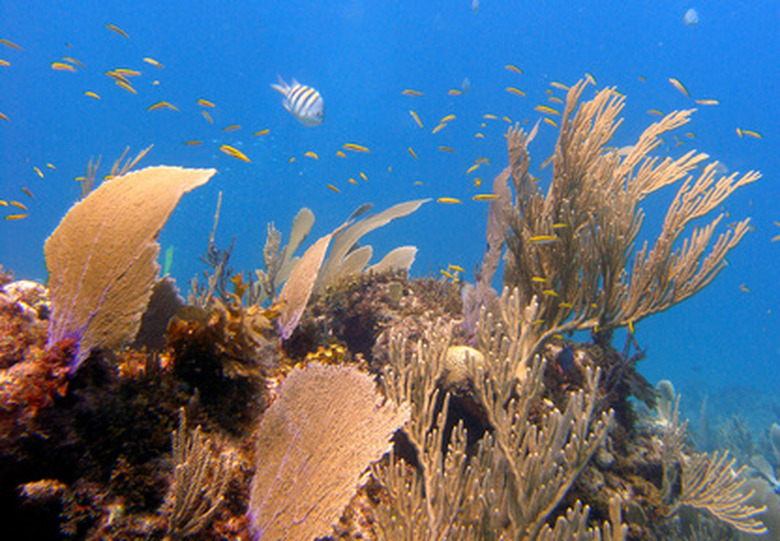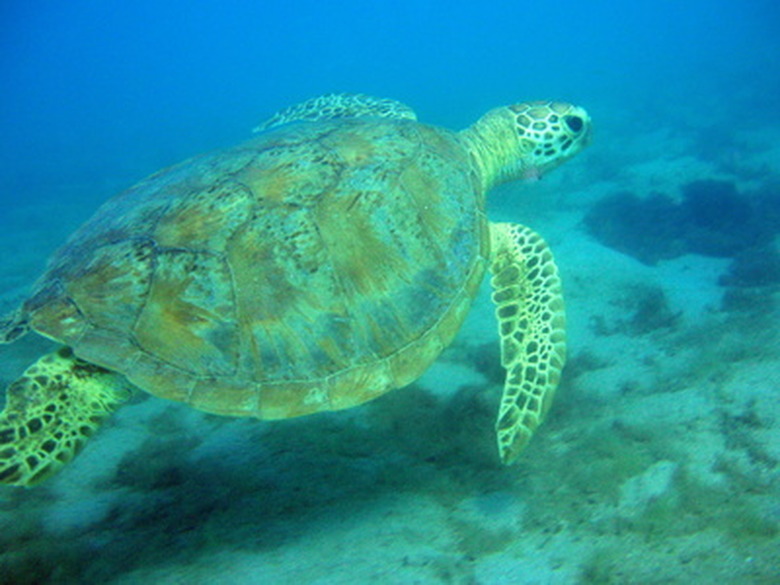Plants That Are In The Biome Of The Coral Reef
A coral reef is an underwater ecosystem, a large ridge of rock made of the skeletons of coral. Coral are marine invertebrate animals (animals without a backbone), individually known as polyps. They are actually the most common of all coral reef animals. Thousands of polyps live together in a colony and excrete calcium carbonate exoskeletons over very long periods of time, creating the structure of a coral reef. Plants in the coral reef are all photosynthetic life forms found within the ecosystem.
Coral Reef Algae
Coral Reef Algae
The most abundant coral reef plant is algae, and the most commonly known type of algae is zooxanthellae, microscopic, single-celled green algae. Zooxanthellae live inside the tissues of coral and help hard corals produce calcium carbonate to build the reef. Through photosynthesis (the process of converting light energy into chemical energy), zooxanthellae provide the coral with food and oxygen.
Two types of multicellular algae are coralline and calcareous. Coralline algae contain long, fine threads of calcium carbonate in their tissue, which spread out across the surface of the reef, trapping sediments of sand and cementing the sand particles together. This supports and strengthens the coral reef structure. Calcareous algae typically grow upright and they produce sand when they die.
Coral Reef Seaweed
Coral Reef Seaweed
Large forms of marine algae are commonly called "seaweeds." Strictly speaking, not all types of seaweed are considered to be plants. The three main types of seaweed are based on color: green seaweed, red seaweed and brown seaweed. Each color consists of photosynthetic pigments designed to make the best use sunlight at different depths.
Green seaweeds are most common in shallow reef areas, typically found on rocky reef surfaces. Two of the most abundant types of green seaweed found in coral reef systems are Ulva (sea lettuce) and Caulerpa (sea grapes).
Red seaweeds are closely related to green seaweeds and may be found on the shallowest reef flats to depths exceeding 150 feet on the fore reef. The most common type of red seaweed is crustose coralline (CCA), whose organisms produce calcium carbonate and help to process coral reef formation, like the corals themselves.
Brown seaweeds are no longer considered plants, but they are part of a diverse group of organisms known as Stramenopiles. While brown seaweeds can be found on coral reefs, they are not so abundant or varied as red or green seaweeds.
"Coral reef seaweed" may also be used as a collective name for the countless species of marine plants and algae that live in the coral reef.
Coral Reef Flowering Plants
Coral Reef Flowering Plants
Two types of flowering plants in the coral reef are mangroves and seagrasses. They both grow rapidly and provide food for coral reef animals. They also decrease sediment buildup in the water by decelerating water movement.
Seagrasses are typically found in the shallow, sheltered waters of coral reef lagoons, forming compact, extensive seagrass meadows. Sea turtles, manatees, dugongs and some fish feed on seagrasses, and young sea animals like conch and lobster shelter within their blades.
Mangroves are large, shrub-like plants that form thick "forests" along tropical and sub-tropical shores. Unlike many other "land" plants, they have evolved to survive saline conditions and complete immersion in sea water, thanks to their salt-filtering roots and salt-eliminating leaves.
Cite This Article
MLA
Gillespie, Claire. "Plants That Are In The Biome Of The Coral Reef" sciencing.com, https://www.sciencing.com/plants-biome-coral-reef-7223988/. 22 November 2019.
APA
Gillespie, Claire. (2019, November 22). Plants That Are In The Biome Of The Coral Reef. sciencing.com. Retrieved from https://www.sciencing.com/plants-biome-coral-reef-7223988/
Chicago
Gillespie, Claire. Plants That Are In The Biome Of The Coral Reef last modified March 24, 2022. https://www.sciencing.com/plants-biome-coral-reef-7223988/

